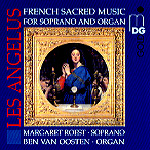There is more “French Sacred Music for Soprano and Organ” than you might realize or remember, and much of it has become well-known and even well-loved by millions of listeners through its ubiquity in the church soloist repertoire. That is to say, everyone–soprano or tenor, flutist or violinist, trumpet, tuba, or accordion player–who ever has performed a solo in church certainly has played or sung one or more of these classics, from Gounod’s Repentir (known in English as O Divine Redeemer) and Franck’s Panis angelicus to Duruflé’s Pie Jesu and Jacques-Nicolas Lemmens’ Laudate Dominum.
Unfortunately, Margaret Roest’s is not a voice that I normally would choose to spend an hour with, although for 10 or 12 minutes it’s possible to hear past the nervous, rapidly quivering vibrato, and even to accept the lack of any real attempt at interpretive gesture or expression. Everything is sung with one color and with a sort of weary, burdened-with-life emotional perspective. It’s all so serious–no one seems to be having any fun at all–and there are some really beautiful, glorious-to-sing pieces here!
Roest occasionally is out of her element, vocally and technically, in the more extreme reaches of her range (as in the low-lying passages of Duruflé’s exquisite Pie Jesu), but at its core her voice has a very pleasing tone, especially if she doesn’t sing too loud. However, there are periodic moments of insecure pitch and unsteadiness (in Chausson’s Pater noster, for instance). She is fortunate to have a partner as seasoned and rock-steady as organist Ben van Oosten, who provides excellent support, from complementary registrations to sensitive phrasing and dynamic levels. In other words, he provides all the interpretation and the singer, well, just sings.
The best part of the disc for me was in discovering some fine works that I didn’t know: Vierne’s Les Angélus; Honegger’s wonderful Trois Psaumes (Roest’s voice, which she forces into an unnatural, darker quality, is all wrong for these); Poulenc’s lovely Priez pour paix; and André Caplet’s atmospheric Oraison Dominicale (the Lord’s Prayer). The sound is full and well-balanced, although the organ is slightly muddy around the edges. Perhaps a better singer with a more appropriate voice and sense of style for these mostly Romantic pieces someday will have the desire and wherewithal to record them. Skip this one.
































